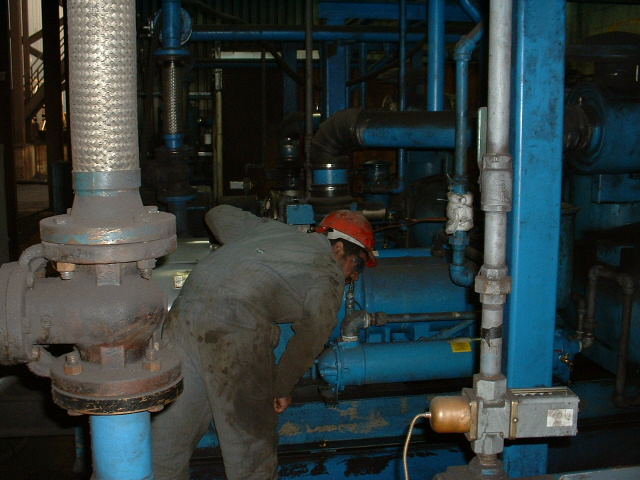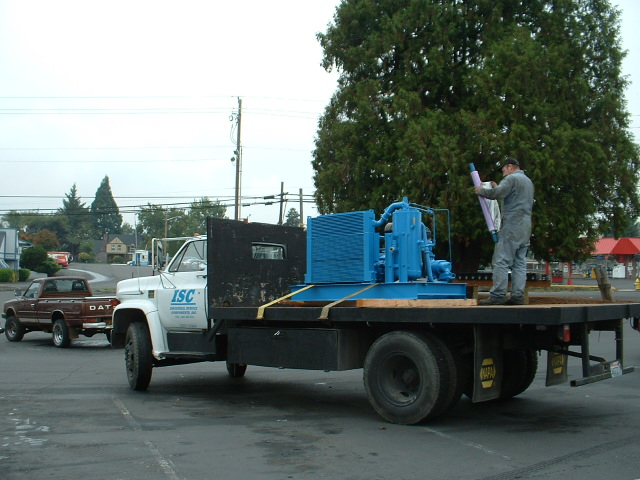Optimizing Construction Efficiency: The Essential Role and Comparing Air Compressors
- Industrial Service Components Inc.

- Feb 12, 2024
- 4 min read

In the bustling world of construction, efficiency is the name of the game. From powering pneumatic tools to operating machinery, air compressors play a pivotal role in ensuring projects run smoothly and on schedule. Understanding the nuances and considerations surrounding the use of air compressors in construction is vital for any project manager or contractor. In this comprehensive guide, we'll delve into the essential role of air compressors in construction projects and explore key considerations to keep in mind.
Understanding the Basics of Air Compressors in Construction:
Before diving into specific considerations, let's establish a foundational understanding of how air compressors function in construction. Air compressors are devices that convert power, typically from an electric motor or a diesel engine, into potential energy stored in pressurized air. This compressed air is then used to power a wide range of tools and equipment commonly found on construction sites, including pneumatic nail guns, jackhammers, and sandblasters.
Power and Performance Requirements:
One of the primary considerations when selecting an air compressor for a construction project is determining the power and performance requirements. Factors such as the size of the project, the types of tools and equipment being used, and the frequency of use all influence the choice of air compressor. For smaller projects or tasks requiring intermittent use of pneumatic tools, a portable air compressor may suffice. However, larger-scale projects or continuous operation may necessitate a stationary or towable compressor with higher horsepower and air volume capacity.
Mobility and Portability:
Mobility is often a crucial factor in construction projects, especially those involving work across expansive sites or multiple locations. Portable air compressors offer the flexibility and convenience required to move seamlessly between different areas of a construction site. Additionally, towable compressors provide even greater mobility, as they can be easily transported from one site to another using a vehicle hitch. When considering the mobility of air compressors, factors such as size, weight, and ease of transportation should be carefully evaluated to ensure optimal efficiency and productivity.
Environmental Considerations:
Construction projects often take place in diverse environments, ranging from urban settings to remote rural areas. Environmental factors such as temperature, humidity, altitude, and dust levels can significantly impact the performance and longevity of air compressors. For example, high temperatures can lead to overheating and reduced efficiency, while dusty conditions may require more frequent maintenance to prevent clogging and damage to components. It's essential to select air compressors that are designed to withstand the specific environmental challenges encountered on construction sites in your area.
Fuel Efficiency and Operating Costs:
In today's construction industry, fuel efficiency and operating costs are top priorities for project managers and contractors. Choosing energy-efficient air compressors can help minimize fuel consumption and reduce operating expenses over the long term. Diesel-powered compressors are often preferred for their fuel efficiency and durability, making them well-suited for remote or off-grid construction sites where access to electricity may be limited. However, advancements in technology have also led to the development of electric-powered compressors that offer comparable performance with lower emissions and operating costs.
Noise Levels and Compliance:
Noise pollution is a significant concern on construction sites, both for workers' health and safety and for compliance with local regulations. Air compressors can generate considerable noise during operation, especially larger models with powerful motors. To mitigate noise levels and ensure compliance with noise ordinances, it's essential to select air compressors equipped with sound-dampening features and to implement noise-reduction measures such as installing barriers or using mufflers. Additionally, scheduling noisy tasks during off-peak hours can help minimize disruptions to nearby residents and businesses.
Maintenance and Servicing:
Regular maintenance and servicing are essential to keep air compressors operating at peak performance and prolong their lifespan. Construction environments can be harsh and demanding, subjecting equipment to heavy usage, dust, debris, and extreme weather conditions. Implementing a proactive maintenance schedule that includes routine inspections, lubrication, filter changes, and component replacements can help prevent costly downtime and repairs. It's also advisable to work with reputable suppliers and manufacturers that offer comprehensive maintenance plans and prompt servicing to address any issues that may arise.
Safety Considerations:
Safety should always be a top priority on construction sites, and air compressors present unique hazards that must be addressed to protect workers and prevent accidents. Pressurized air can pose risks of over inflation, bursting hoses, and flying debris if not handled properly. Proper training in the safe operation and maintenance of air compressors is essential for all personnel who will be using or working near these devices. Additionally, implementing safety protocols such as conducting regular risk assessments, providing personal protective equipment (PPE), and installing safety guards and shutoff valves can help minimize the risk of injuries and ensure a safe working environment.
In conclusion, air compressors are indispensable tools in the construction industry, powering a wide range of equipment and tools essential for completing projects efficiently and effectively. By considering key factors such as power and performance requirements, mobility and portability, environmental considerations, fuel efficiency and operating costs, noise levels and compliance, maintenance and servicing, and safety considerations, project managers and contractors can make informed decisions when selecting and utilizing air compressors for construction projects. By prioritizing efficiency, productivity, and safety, construction professionals can maximize the benefits of air compressors and optimize project outcomes.
(C) Industrial Service Components Inc. 2024 compare air compressors
Optimizing Construction Efficiency: The Essential Role and Comparing Air Compressors











Comments